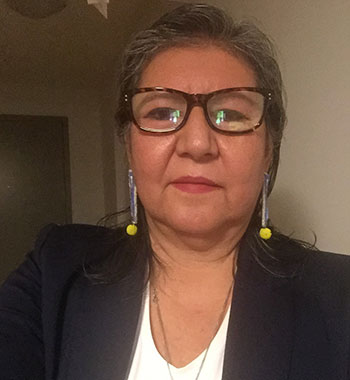Bringing generations of knowledge to health care

By Amber Daugherty

Westwind
When Westwind speaks, she brings generations of wisdom with her. As the knowledge keeper for Unity Health Toronto’s First Nations, Métis, Inuit and Indigenous Community Advisory Panel (CAP), she shares her own lived experience as an Anishinaabe woman as well knowledge she’s gleaned in more than 30 years of working with elders.
A large piece of that experience relates to the definition of health.
“When we address someone’s health care needs, we have to be mindful of the four dimensions, also known as the Medicine Wheel: mental, physical, emotional and spiritual,” she said. “Physical needs are a small part of that person.”
The CAP was established to help health care teams provide culturally aware, sensitive, competent, safe and holistic care to the thousands of First Nations, Métis, Inuit and Indigenous patients who come to St. Michael’s Hospital – and now Unity Health – for care.
A 2019 study done in collaboration with Well Living House, a research institute focusing on Indigenous health and well-being located at St. Michael’s, found that First Nations, Inuit and Métis peoples in Toronto experience negative health impacts associated with discrimination in health care settings.
Westwind says traditional Indigenous healing approaches and Indigenous cultural safety practices should be incorporated into health care.
“You have to go where the roots are to deal with the cause of the issue instead of just the symptoms,” she said. “A lot of our elders talk about the things we go through in our lives with the legacy of residential schools, Indian Act and systemic racism. Those are the things we need to be mindful of in giving people what they need to get well.”
Westwind has consulted on initiatives that touch on Indigenous culture, teachings or ceremonies. She also opens and closes CAP meetings, leading the other panel members through a smudging, a traditional ceremony practiced by some Indigenous peoples that involves burning sacred medicines to purify and cleanse negative energy.
“Every generation has knowledge keepers and we pass on our knowledge, teachings, stories, dances and songs,” she said. “When I participate in the panel and discussions around the table, I see it all through my perspective, my culture’s perspective.”
And at the same time all of this is happening, she’s also learning.
“Sharing is a two-way street,” she said. “I’m learning how the health system works from everyone sharing their job and what they do whether they’re a nurse, admin or researcher. I do feel they’re really committed to doing the best they can to promote healing and wellness in their patients and community and that’s something I think we all share – that’s why I’m there.”
About St. Michael’s Hospital
St. Michael’s Hospital provides compassionate care to all who enter its doors. The hospital also provides outstanding medical education to future health care professionals in more than 27 academic disciplines. Critical care and trauma, heart disease, neurosurgery, diabetes, cancer care, care of the homeless and global health are among the Hospital’s recognized areas of expertise. Through the Keenan Research Centre and the Li Ka Shing International Healthcare Education Centre, which make up the Li Ka Shing Knowledge Institute, research and education at St. Michael’s Hospital are recognized and make an impact around the world. Founded in 1892, the hospital is fully affiliated with the University of Toronto.
About Unity Health Toronto
Unity Health Toronto, comprised of Providence Healthcare, St. Joseph’s Health Centre and St. Michael’s Hospital, works to advance the health of everyone in our urban communities and beyond. Our health network serves patients, residents and clients across the full spectrum of care, spanning primary care, secondary community care, tertiary and quaternary care services to post-acute through rehabilitation, palliative care and long-term care, while investing in world-class research and education. For more information, visit www.unityhealth.to.
